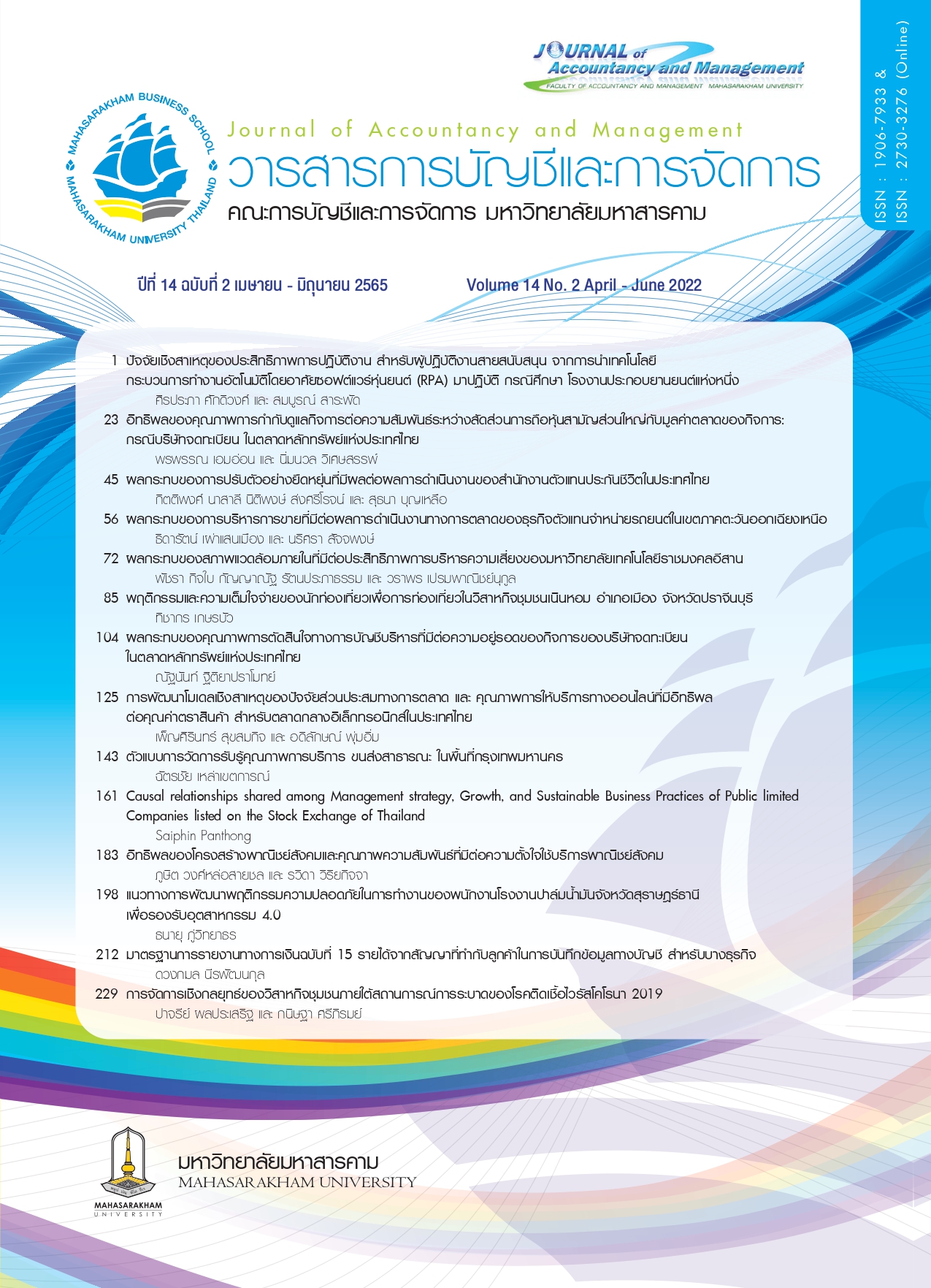การจัดการเชิงกลยุทธ์ของวิสาหกิจชุมชนภายใต้สถานการณ์การระบาดของโรคติดเชื้อไวรัสโคโรนา 2019
Main Article Content
บทคัดย่อ
การแพร่ระบาดของโรคติดเชื้อไวรัสโคโรนา 2019ส่งผลกระทบในทุกภาคส่วนทำให้รายได้ของประเทศลดลงอย่างเฉียบพลัน โดยเฉพาะผู้ประกอบการรายย่อยขาดกำลังทุนและประชาชนขาดกำลังซื้อ ทั้งนี้การฟื้นตัวของเศรษฐกิจไทยต้องเริ่มจากการสร้างความเข้มแข็งภายในประเทศด้วยการสร้างฐานให้มั่นคงกับวิสาหกิจชุมชน ซึ่งวัตถุประสงค์ของบทความนี้จึงนำเสนอแนวคิดการจัดการเชิงกลยุทธ์วิสาหกิจชุมชนที่เหมาะสมจากการได้รับผลกระทบจากสถานการณ์การระบาดของโรคติดเชื้อไวรัสโคโรนา 2019 โดยเริ่มจากการกำหนดทิศทางการผลิตผลิตภัณฑ์ในระยะยาวจากการวิเคราะห์สภาพแวดล้อมภายใน สภาพแวดล้อมภายนอก โอกาส และอุปสรรคเพื่อการวางกลยุทธ์การจัดการวิสาหกิจชุมชนเชิงรุกเพื่อสร้างความได้เปรียบในการแข่งขันด้านต่าง ๆ ที่สอดคล้องกับแนวคิดเชิงทฤษฎี ได้แก่ การสร้างความได้เปรียบในการแข่งขันด้านต้นทุน ด้านการสร้างเอกลักษณ์ การมุ่งเน้นการตอบสนองตลาดเฉพาะ และรวมถึงการสร้างคุณค่าให้กับลูกค้าจากห่วงโซ่คุณค่าที่ร้อยเรียงกิจกรรมในทุกกระบวนการเข้าด้วยกันอย่างต่อเนื่อง และการสร้างความสามารถในการฟื้นฟูรายได้สอดรับกับสถานการณ์การระบาดของโรคติดเชื้อไวรัสโคโรนา 2019เกิดการจ้างงานและพัฒนาเศรษฐกิจของวิสาหกิจชุมชนและประเทศชาติ เป็นไปตามแผนการบริหารจัดการในการฟื้นฟูรายได้จากผลกระทบสถานการณ์การระบาดของโรคติดเชื้อไวรัสโคโรนา 2019
Downloads
Article Details

อนุญาตภายใต้เงื่อนไข Creative Commons Attribution-NonCommercial-NoDerivatives 4.0 International License.
บทความที่ได้รับการตีพิมพ์เป็นลิขสิทธิ์ของวารสารการบัญชีและการจัดการ
ข้อความที่ปรากฏในบทความแต่ละเรื่องในวารสารวิชาการเล่มนี้เป็นความคิดเห็นส่วนตัวของผู้เขียนแต่ละท่านไม่เกี่ยวข้องกับมหาวิทยาลัยมหาสารคาม และคณาจารย์ท่านอื่นๆในมหาวิทยาลัยฯ แต่อย่างใด ความรับผิดชอบองค์ประกอบทั้งหมดของบทความแต่ละเรื่องเป็นของผู้เขียนแต่ละท่าน หากมีความผิดพลาดใดๆ ผู้เขียนแต่ละท่านจะรับผิดชอบบทความของตนเองแต่ผู้เดียว
เอกสารอ้างอิง
กรมควบคุมโรค, กองโรคติดต่อทั่วไป. (2564). สถานการณ์โรคติดเชื้อไวรัสโคโรนา 2019 มาตรการสาธารณสุขและปัญหาอุปสรรคการป้องกันควบคุมโรคในผู้เดินทาง. ค้นเมื่อ 14 กันยายน 2564,จาก https://ddc.moph.go.th
กรมส่งเสริมการเกษตร. (2562). คู่มือส่งเสริมวิสาหกิจชุมชน. ค้นเมื่อ 15 กันยายน 2564, จาก http://www.sceb.doae.go.th
คณะกรรมการกลั่นกรองการใช้จ่ายเงินกู้. สำนักงานสภาพัฒนาการเศรษฐกิจและสังคมแห่งชาติ. (2563). แผนการฟื้นฟูเศรษฐกิจและสังคมจากผลกระทบของไวรัสโควิด-19. ค้นเมื่อ 9 สิงหาคม 2564, จาก http://nscr.nesdb.go.th/wp-content/uploads/2020/07/แผนฟื้นฟูเศรษฐกิจและสังคมหลังโควิด.pdf
จันทนา ฤทธิ์สมบูรณ์ และ ทักษญา สง่าโยธิน. (2562). ห่วงโซ่มูลค่าเพื่อการพัฒนาวิสาหกิจชุมชนอย่างยั่งยืนด้วยแนวคิดผู้ประกอบการรุ่นใหม่ (YEC). วารสารวิทยบริหาร มหาวิทยาลัยสงขลานครินทร์, 30(1), 104-117.
ฉัตรปวีณ์ จรัสวราวัฒน์. (2556). การบริหารงานในองค์กรในช่วงเหตุการณ์ที่วิกฤติ. วารสารบัณฑิตศึกษา มนุษยศาสตร์และสังคมศาสตร์, 2(1),1-14.
ทักษญา สง่าโยธิน. (2560). ปัจจัยแห่งความสำเร็จของการดำเนินงานวิสาหกิจชุมชน. วารสารพาณิชยศาสตร์บูรพาปริทัศน์, 12(2), 11-25.
ทศพร แก้วขวัญไกร. (2560). ทางรอดวิกฤติเศรษฐกิจด้วยแนวทางวิสาหกิจชุมชน. วารสารวิชาการ มหาวิทยาลัยราชภัฏบุรีรัมย์, 9(2), 33-50.
ธัญญ์นิธิ จิรพัฒนาพรสิน. (2563). แนวทางการจัดการเชิงกลยุทธ์และความได้เปรียบในการแข่งขันขององค์กร หลักฐานเชิงประจักษ์กิจการในภาคธุรกิจอุตสาหกรรมไทย. วารสารนักบริหาร, 40(2), 64-80
นงคราญ ไชยเมือง และจิรัฏฐ์ กาญจน์บุญเรือง. (2561). การจัดการเชิงกลยุทธ์ของวิสาหกิจเพื่อสังคมสู่ประเทศไทย 4.0. วารสารมหาวิทยาลัยพายัพ, 28(1), 1-18.
ปกรณ์ อุดมธนะสารสกุล. (2564). อิทธิพลของนโยบายรัฐบาลและการจัดการภาวะวิกฤตที่มีต่อกลยุทธ์การดำเนินงานของวิสาหกิจขนาดกลางและขนาดย่อมภาคบริการในจังหวัดเชียงใหม่ในช่วงวิกฤตของโรคระบาดโควิด-19. วารสารการบัญชีและการจัดการ มหาวิทยาลัยมหาสารคาม, 13(2), 76-93.
พรรณราย ละตา สุธนา บุญเหลือ และศรัญญา รักสงฆ์. (2560). การตรวจสอบเชิงประจักษ์โมเดลตามสถานการณ์ของกลยุทธ์ระบบการวัดผลการดำเนินงานแบบบูรณาการ: หลักฐานจากบริษัทจดทะเบียนในตลาดหลักทรัพย์แห่งประเทศไทย. RMUTT Global Business and Economics Review, 12(2), 47-68.
รชฏ เลียงจันทร์. (2564). เศรษฐกิจไทยจะเป็นอย่างไร หากเราต้องอยู่กับโควิด-19 ตลอดไป. ค้นเมื่อ 13 กันยายน 2564, จาก https://www.krungsri.com/th/research/research-intelligence/ri-covid-recovery-2021
วิจัยกรุงศรี. (2564). แนวโน้มธุรกิจและอุตสาหกรรมไทย ปี 2564-2566. ค้นเมื่อ 21 ตุลาคม 2564, จาก https://www.krungsri.com/getmedia/3a84bfe7-f2ab-4af2-aa5c-ad073656bfe3/SO_Industry_Outlook_2021_2023_210108_EN_EX.pdf.aspx
ศิระประภา เอื้อวิวัฒน์สกุล. (2563). ผลกระทบและทิศทางของภาคอุตสาหกรรมหลังสถานการณ์การแพร่ระบาดของเชื้อไวรัสโควิด-19. ค้นเมื่อ 21 ตุลาคม 2564, จาก http://www.oie.go.th/assets/portals/1/fileups/2/files/ ArticlesAnalysis/Direction_industry_after_COVID-19.pdf
เสาวณี จันทะพงษ์ และนิธิสาร พงศ์ปิยะไพบูลย์. (2560). 20 ปีวิกฤตเศรษฐกิจ 2540: บทเรียนสู่เส้นทางเศรษฐกิจที่สมดุลและยั่งยืน. ค้นเมื่อ 13 กันยายน 2564, จาก https://www.bot.or.th/Thai/MonetaryPolicy/ArticleAndResearch/FAQ/FAQ_115.pdf
สุนิสา ละวรรณวงษ์ และนรินทร์ สังข์รักษา. (2558). การพัฒนารูปแบบการจัดการเชิงกลยุทธ์ของวิสาหกิจชุมชนอัญมณีและเครืองประดับ จังหวัดกาญจนบุรีเพื่อการแข่งขันสู่ประชาคมอาเซียน. Veridian E-Journal, Silpakorn University, 8(1), 1192-1211.
สำนักงานคณะกรรมการพัฒนาการเศรษฐกิจและสังคมแห่งชาติ, สำนักนายกรัฐมนตรี. (2559). ภาพรวมการพัฒนาในช่วงแผนพัฒนาฯ ฉบับที่ 12. ค้นเมื่อ 13 กันยายน 2564, จาก https://www.nesdc.go.th/ewt_dl_link.php?nid=6422
สำนักงานปลัดกระทรวงการท่องเที่ยวและกีฬา (2564). การระบาดของโควิด-19 รุนแรงสุดในรอบหลายทศวรรษ. รายงานภาวะเศรษฐกิจการท่องเที่ยว (Tourism Economic Review), 1(4), 30-41.
อินท์ชลิตา วัชรีจิระโชติ. (2556). การศึกษาเปรียบเทียบการจัดการวิสาหกิจชุมชน กลุ่มผลิตผ้าไหม อำเภอบ้านเขว้า และกลุ่มผลิตผ้าไหม อำเภอคอนสวรรค์ จังหวัดชัยภูมิ. วารสารวิชาการบริหารธุรกิจ สมาคมสถาบันอุดมศึกษาเอกชนแห่งประเทศไทย (สสอท.), 2(2), 47-63.
อภิสิทธิ์ พรมชัย และศุภลักษณ์ สุวรรณะชฏ. (2554). ความสำเร็จของกลุ่มวิสาหกิจชุมชนแม่บ้านห้วยการ. วารสารการบริหารท้องถิ่น, 4(2), 16-29.
อภิสิทธิ์ ฉัตรทนานนท์. (2552). กลยุทธ์การบริหารภาวะวิกฤติสะหรับผู้นำองค์กร. วารสารบริหารธุรกิจ, 32(122), 8-18.
องค์การอนามัยโลก. (2564). โรคไวรัสโคโรนา. ค้นเมื่อ 13 กันยายน 2564, จาก https://www.who.int/thailand/
Barney, J. B. (1991). Firm resources and sustainable competitive advantage. Journal of Management, 17, 99-120.
Caves, R., & Ghemawat, P. (1992). Identifying Mobility Barriers. Strategic Management Journal, 13, 1-12.
Certo, S. C. (2009). Modern Management. (9th ed.). New Jersey : Prentice Hill.
Ditkaew, K., Pitchayatheeranart, L., & Jermsittiprasert, K. (2020). The Causal Structure Relationships between Accounting Information System Quality, Supply Chain Management Capability, and Sustainable
Competitive Advantage of Mize. International Journal of Supply Chain Management, 9(1), 144-154.
Ditkaew, K., Jermsittiprasert, K., & Kaliappen, N. (2021). Strategic Cost Management on Success Logistics Management for Sustainable Performance of Export Business. International Journal of Entrepreneurship, 25(Special Issue 2), 1-13.
Kotler, P. (2003). Marketing management. (11th ed.). New Jersey : Pearson Education.
McKinsey, J. C. C. (1952). Introduction the Theory of Games. New York : McGraw-Hill.
Njue, C. M., & Ongoto, H. K. (2018). Strategic management practices and change implementation in selected public universities in Kenya. International Academic Journal of Human Resource and Business Administration, 3(4), 124-149
Office or the National Economic and Social Development Council. (2020). Economic and social recovery plan from the impact of the Covid-19 virus. Retrieved on August 9th, 2021, from http://thai.me.nesdc.go.th
Pickton, D. W., & Wright, S. (1997). SWOT analysis-Its role in strategic and management development in SMEs. In Small Business and Enterprise Development Conference, Sheffield, UK: Sheffield University, 1-10.
Porter, M. E. (2000). Competitive Strategy: Technique for Analyzing Industries and Competitors. New York : Prentice-Hall Publishing.
Ravanfar, M. M. (2015). Analyzing Organizational Structure Based on 7s Model of Mckinsey. Journal of Management and Business Research: A Administration and Management, 15(10), 6-12.
Stoner, James A.F. (1986). Management. Englewood Cliffs, New York : Prentice Hall.
Wheelen, T. L., & Hunger, J. D. (2012). Strategic Management and Business Policy : toward global sustainability. (13th. Edition). N.J. : Prentice-Hall.


